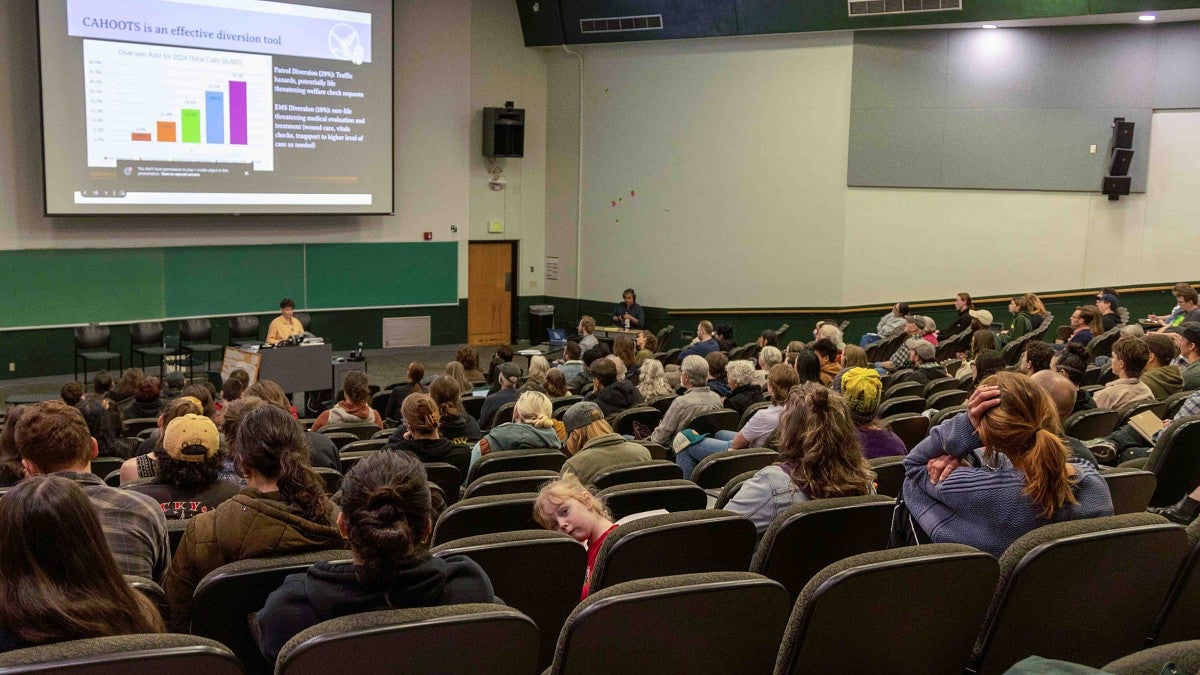
April 15, 2025 - 5:00pm
On Thursday, April 10, researchers from the College of Arts and Sciences hosted a town hall to present findings about the positive impact that CAHOOTS has had on the Eugene community. Attended by about 200 people, the forum was held days after the city of Eugene announced that it would eliminate funding for CAHOOTS.
Founded in 1989, Crisis Assistance Helping Out on the Streets, or CAHOOTS, has been a leading provider of mental health crisis intervention in the Eugene-Springfield area. However, after the city of Eugene announced it would cut funding for the service, about 80% of CAHOOTS’s staff were laid off, resulting in cutbacks to essential services in the community. During the April 10 forum, CAS researchers from the School of Computer and Data Sciences presented data that they say supports and advocates the importance of CAHOOTS.
“They ask how we are going to afford CAHOOTS, but I think the better question is: how could we afford to go without CAHOOTS?” said researcher Nathan Burton during his presentation.
Burton, who graduated in June 2024 with a bachelor’s degree in data science, conducted research on the impact of CAHOOTS as an undergrad. After graduation, he continued his work that focuses on how many calls have been diverted from police to CAHOOTS, and how many calls go straight to CAHOOTS.
Before CAHOOTS expanded its services to 3 to 7 a.m. in 2017, police would be the only respondents to calls. But when CAHOOTS began operating at that time, Burton found there was a visible diversion rate, showing how many calls that would’ve typically gone straight to police, went to CAHOOTS.
“Every single one of those 10,000 calls is a real person and a real moment of need where CAHOOTS was there to help. And because they were there to help, the police officers had more time to focus on other calls,” Burton said. “Then people in crisis were met by trained mental health professionals, and our community was made that much safer.”
CAHOOTS not only allowed mental health experts to aid people in their time of crisis, but it enabled police officers to respond to calls they were more equipped to handle. Eventually, CAHOOTS started receiving calls straight to them, instead of being diverted from police. Findings showed that often, they end up de-escalating a situation quicker when they’re the first to respond.
“CAHOOTS makes a remarkable difference in our community right now. They divert around 17% of all dispatch calls every year, and that's major involvement by itself,” Burton said. “But our research also shows that this isn't just responding to crises, they're actually preventing them from ever happening in the first place.”
As CAHOOTS members shift efforts to advocating for its return, Burton and Associate Professor Rori Rohlfs are examining more recent data that support these efforts. Though CAHOOTS was defunded after they started their research, their findings have become more important following recent events, the researchers said at the forum.
“We did these statistical analyses about who's impacted, which we intend to publish, and we expect to be a part of an academic discourse. Through the course of that project, this defunding happened, so we're also thinking about some next questions that we're going to ask with the new data,” Rohlfs said. “The findings speak for themselves. As long as we're presenting our findings, they show the value of CAHOOTS.”
Alongside UO researchers, members of CAHOOTS teams presented, sharing personal experiences working for the organization, and statistical analysis that also supports the argument for CAHOOTS’s funding. Alese “Dandy” Colehour, a worker at CAHOOTS and a master’s student at Portland State University, shared findings from survey respondents that detailed CAHOOTS’s community impact.
“This is essential to public safety. The community wants more of us, not less,” Colehour said. “What we learned on the survey is that you, the cities of Eugene and Springfield, believe what CAHOOTS provides is a vital service and we have earned the trust of this community over 35 years as a leading provider of mental health crisis and investment in Eugene.”
Both testimonies from CAHOOTS employees and findings from UO researchers underline the necessity of CAHOOTS as a service to the community. As CAHOOTS aims to get back its funding, it is likely that support from the School of Data and Computer Science will support their cause.
“I think that ultimately whether it be somebody from the UO or somebody from Portland or somebody from elsewhere, data is really more important, in showing correlation of improvement,” Vanessa Lepe, a doctoral student in sociology at CAS. “We’ve seen here that clearly there's a positive association of these things being interrelated. CAHOOTS is having an impact on the community and on the members that they're intending to serve. So, I hope to see those in conversations in the future.”
— By Grace Connolly, College of Arts and Sciences
